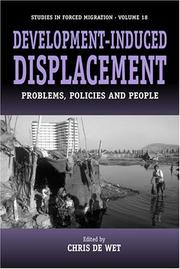| Listing 1 - 4 of 4 |
Sort by
|

ISBN: 1845450965 1845450957 1789203880 Year: 2005 Publisher: New York, New York ; Oxford : Berghahn Books,
Abstract | Keywords | Export | Availability | Bookmark
 Loading...
Loading...Choose an application
- Reference Manager
- EndNote
- RefWorks (Direct export to RefWorks)
Some ten million people worldwide are displaced or resettled every year, due to development projects, such as the construction of dams, irrigation schemes, urban development, transport, conservation or mining projects. The results have usually been very negative for most of those people who have to move, as well as for other people in the area, such as host populations. People are often left socially and institutionally disrupted and economically worse-off, with the environment also suffering as a result of the introduction of infrastructure and increased crowding in the areas to which people had to move. The contributors to this volume argue that there is a complexity, and a tension, inherent in trying to reconcile enforced displacement of people with the subsequent creation of a socio-economically viable and sustainable environment. Only when these are squarely confronted, will it be possible to adequately deal with the problems and to improve resettlement policies.
Economic development projects --- Forced migration --- Land settlement --- Cleansing, Ethnic --- Compulsory resettlement --- Ethnic cleansing --- Ethnic purification --- Involuntary resettlement --- Migration, Forced --- Purification, Ethnic --- Relocation, Forced --- Resettlement, Involuntary --- Migration, Internal --- Resettlement --- Settlement of land --- Colonies --- Land use, Rural --- Human settlements
Book
Abstract | Keywords | Export | Availability | Bookmark
 Loading...
Loading...Choose an application
- Reference Manager
- EndNote
- RefWorks (Direct export to RefWorks)
Mazagão (Brazil) --- Jadida (Morocco) --- Portugal --- Brazil --- Mazagão (Brésil) --- Brésil --- History. --- History --- Colonies --- Ethnic relations --- Histoire --- Relations interethniques --- Forced migration --- Cleansing, Ethnic --- Compulsory resettlement --- Ethnic cleansing --- Ethnic purification --- Involuntary resettlement --- Migration, Forced --- Purification, Ethnic --- Relocation, Forced --- Resettlement, Involuntary --- Migration, Internal --- Nova Mazagão (Brazil)
Book
Abstract | Keywords | Export | Availability | Bookmark
 Loading...
Loading...Choose an application
- Reference Manager
- EndNote
- RefWorks (Direct export to RefWorks)
The choice between temporary and permanent migration is today central to the design of migration policies. The authors draw a distinction between the two types of migration on the basis of the associated social cost and the dynamics of learning by migrants. They find that unilateral migration policies are globally inefficient because they lead to too much permanent migration and too little temporary and overall migration. Existing international agreements on labor mobility, such as the World Trade Organization's General Agreement on Trade in Services, have failed to do better because they seek primarily to induce host countries to make commitments to allow entry. Instead, Pareto gains and more liberal migration could be achieved through multilateral agreements that enable host countries to commit to repatriation.
Anthropology --- Brain Drain --- Brain-Drain --- Communities & Human Settlements --- Culture & Development --- Health, Nutrition and Population --- Home Countries --- Host Countries --- Host Country --- Human Migrations and Resettlements --- Immigrants --- International Agreements --- Migrants --- Migration Policies --- Multilateral Agreements --- Policy --- Policy Research --- Policy Research Working Paper --- Population Policies --- Progress --- Remittances --- Repatriation --- Skill Level --- Skilled Workers --- Social Development --- Temporary Migration --- Training --- Voluntary and Involuntary Resettlement
Book
Abstract | Keywords | Export | Availability | Bookmark
 Loading...
Loading...Choose an application
- Reference Manager
- EndNote
- RefWorks (Direct export to RefWorks)
The choice between temporary and permanent migration is today central to the design of migration policies. The authors draw a distinction between the two types of migration on the basis of the associated social cost and the dynamics of learning by migrants. They find that unilateral migration policies are globally inefficient because they lead to too much permanent migration and too little temporary and overall migration. Existing international agreements on labor mobility, such as the World Trade Organization's General Agreement on Trade in Services, have failed to do better because they seek primarily to induce host countries to make commitments to allow entry. Instead, Pareto gains and more liberal migration could be achieved through multilateral agreements that enable host countries to commit to repatriation.
Anthropology --- Brain Drain --- Brain-Drain --- Communities & Human Settlements --- Culture & Development --- Health, Nutrition and Population --- Home Countries --- Host Countries --- Host Country --- Human Migrations and Resettlements --- Immigrants --- International Agreements --- Migrants --- Migration Policies --- Multilateral Agreements --- Policy --- Policy Research --- Policy Research Working Paper --- Population Policies --- Progress --- Remittances --- Repatriation --- Skill Level --- Skilled Workers --- Social Development --- Temporary Migration --- Training --- Voluntary and Involuntary Resettlement
| Listing 1 - 4 of 4 |
Sort by
|

 Search
Search Feedback
Feedback About UniCat
About UniCat  Help
Help News
News